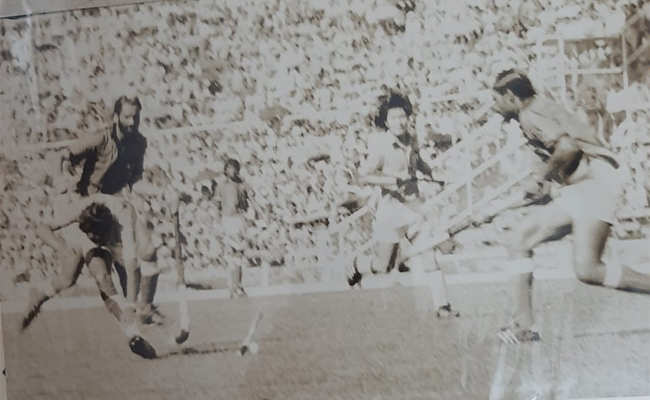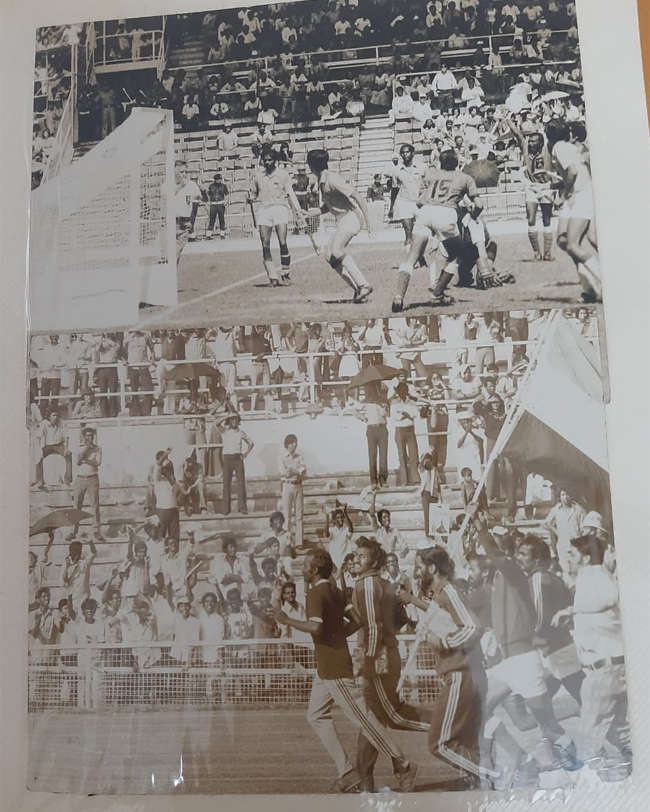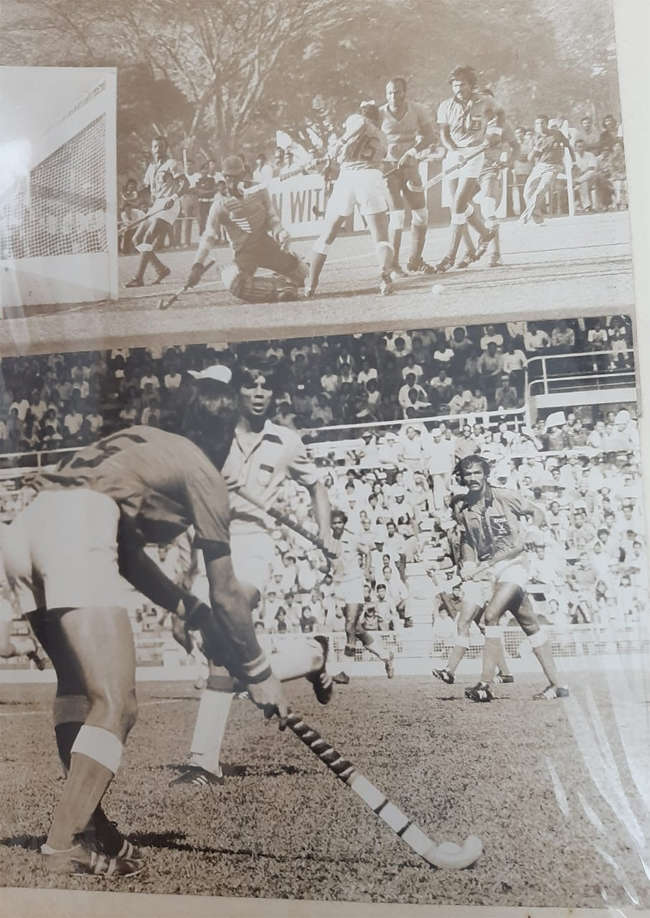All those who received these messages over the last fortnight lived every moment of that hockey history. The messages are a treasure trove for every hockey lover. The words breathe the connection Indians used to have with the sport.
Victory against Pakistan in the final in 1975 made it sweeter. But how much that World Cup title mattered to Indians in general can be measured with what happened before the semifinal against Malaysia.
The Indian team boarded the bus at 8 am. The maddening crowds on the streets of Kuala Lumpur felt like every road led to the Merdeka Stadium. That’s when Kumar chose to use his penchant for singing to motivate the team on the way to the stadium.

“Mera rang de basanti chola geet ki taan chhed di (started singing the patriotic song). Sabhi khiladiyo ne swar mei swar mila liya..pura mahaul desh bhakti ke rang mei rang gaya (all the players joined in to sing the song and the atmosphere was alive with the emotion of patriotism),” Kumar wrote in his message on March 13.
What happened later inside the dressing room filled the team with a sense of responsibility and pride.
“The players were ready for the match,” Kumar’s message, written in Hindi originally, read. “A lady entered the dressing room and took out a photograph from her purse. It was an image of the tenth Guru of the Sikhs, Guru Gobind Singh Ji.
“The players bowed their heads in respect, as the lady said, ‘Today you have to play for the pride of the Guru’ and started crying.”
INDIA ENTERED THE FINAL
India went on to win the semi-final 3-2, but that was after some “sense” prevailed among the Indian team management led by coach GS Bodhi and manager Balbir Singh Sr.
“Some sense prevailed among our management, and five-six minutes before the final hooter, they pulled out defender Michael Kindo and replaced him with Aslam (Sher Khan). Aslam scored the equaliser to make it 1-1,” said Kumar talking to Timesofindia.com.
Harcharan Singh then scored in extra time as India beat the hosts to enter the final.
“Five-six minutes on grass is not much; it’s a lot on turf these days but not on natural grass we played on in our time. Aslam scored off the penalty corner. Those four minutes earned him a place in the team for the final.” Kumar further told TimesofIndia.com.

(Photo credit: Ashok Kumar)
THE PAIN OF 1973
The biggest motivation for the 1975 edition of the World Cup though had its source in the defeat in the 1973 final. Kumar and some of his team-mates had lived with that pain for two years, especially Kumar, who missed a goal.
Amid drama, India lost the final to the Netherlands in a penalty shootout after the regulation period ended with the scoreline reading 2-2 and extra time failed to break the deadlock.
“It created a void in my life. Our team led (Netherlands in the final) by a two-goal margin. But then the match ended in a draw, went to extra time, I missed a goal and then we lost in sudden death (penalty shootout). That was one such void, and still is. We remember wins, but also the losses,” said Kumar.
“There was not a single day or night when we forget our 1973 WC defeat,” he said, with pain discernible in his voice.
“Hum baat nahi karte the, hum rote the (we didn’t talk about it, we used to cry over it). The World Cup means the World Cup. Hockey was regarded very highly in the country at that time. We won the cricket World Cup later (1983). The first World Cup for the country had slipped from our hands in 1973.” Kumar told TimesofIndia.com.
‘KUCCH BHI HO JAYE’ (NO MATTER WHAT HAPPENS)
Besides the pain of 1973, there were a few hiccups in India’s road to the final in 1975.
A draw against Australia and an upset defeat to Argentina shook the team a little. Kumar was rested for the latter game, and the team paid for that complacency against the Argentines.
“(After) missing out on those points in the league stage, it was a comeback of sorts,” Kumar recalled, before sharing another little anecdote about a moment that lifted him.
The team was entering the hotel to check in. This was before the tournament. The lobby was abuzz as the World Cup trophy was being displayed. It couldn’t miss Kumar’s eyes, and sort of reopened the wound of 1973 and gave him a sense of determination.
“I went closer to it (the trophy), stared at it. It gave me a boost. Iss Cup ko nahi chhorna hai, kuchh bhi ho jaaye (we won’t miss winning this Cup, come what may),” Kumar narrated.

(Photo credit: Ashok Kumar)
‘BAU JI KI THAPKIYA’ (PATS ON THE BACK BY THE LEGENDARY MAJOR DHYAN CHAND)
The win in the final had an extra dash of sweetness as it came against archrivals Pakistan, who had won the inaugural edition of the tournament in 1971.
For Kumar, it was salvation of sorts. After missing that goal in the 1973 final, he scored the winner in 1975. India won 2-1, with Surjit Singh Randhawa scoring the equaliser after Muhammad Zahid Sheikh had put Pakistan ahead.
In the 51st minute, Kumar finally redeemed himself.
“When that winning goal came off my stick, then I felt that I can stand in front of my Bau ji (father Major Dhyan Chand), that I have won a gold medal.”
The legend of Indian hockey, Major Dhyan Chand, Kumar’s Bau Ji (father), now had another gold-medal winner in the house.

(Photo credit: Ashok Kumar)
“I reached Ranchi. A passage of 3 km from Jhansi station to my home, we covered in 3 to 4 hours. Such was the welcome I received.” Kumar recalled while talking to TimesofIndia.com.
His father, mother and sisters were waiting at the door. But Dhyan Chand didn’t say a word when he met his son. He was not in favour of Ashok playing hockey.
“He used to say ‘hockey mat khelo, hockey se career nahi banega’. He was right. There was no career in hockey those days. It was not professional like today,” the 70-year-old Kumar said.
“Darwaze par maa, Bau ji or behne khadi thi (my mother, father and sisters stood at the entrance of our house). I touched their feet. Bau Ji ne bas thapkiya di peeth par (my father patted my back), no words,” he reminisced.
“Un thapkiyo ne sab keh diya (those pats said it all). We never used to interact much; that’s how it was in those days. But it told me that he was happy ke unke ghar se kisi aur ne bhi bharat ke liye gold medal jeeta hai (that someone else from his house has also won gold for the country).”



)



More News
‘Lost for words, unreal batting’: KL Rahul left stunned as Hyderabad blow away Lucknow | Cricket News – Times of India
166-run hunted down in mere 45 minutes! Sunrisers Hyderabad onslaught goes to a new high | Cricket News – Times of India
Mumbai Indians first team to get knocked out of IPL 2024 play-off race | – Times of India